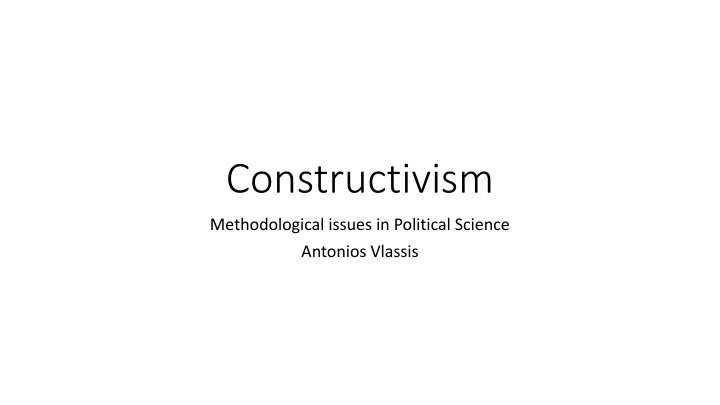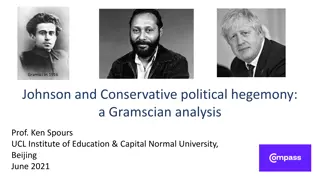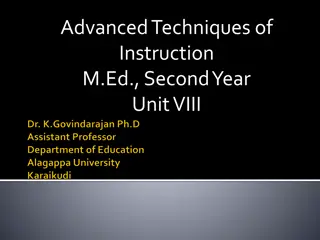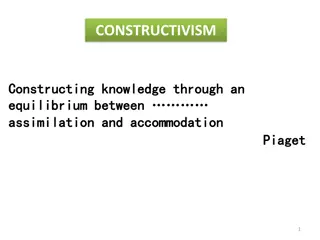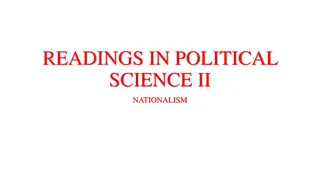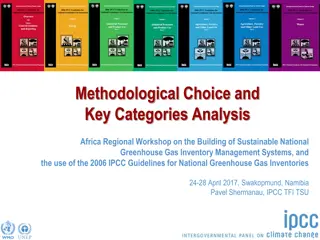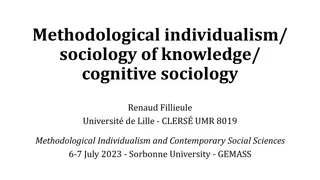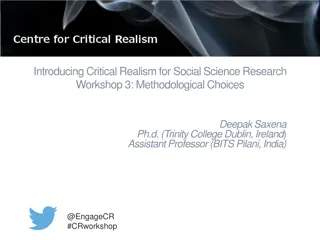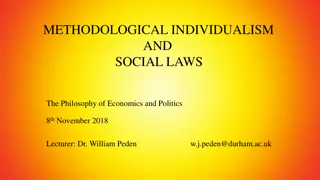Methodological Issues in Political Science: Constructivism and Challenging Assumptions
Constructivism in Political Science challenges traditional rationalist theories by focusing on human consciousness and social facts. It highlights the role of shared beliefs in shaping interests and identities of actors, emphasizing ideational factors over material ones. This approach, encompassing critical and post-modern perspectives, critiques prevailing assumptions about knowledge, the social world, and theory purpose. Constructivism's impact in International Relations, Public Policy, and European studies underscores its significance in redefining understandings of politics.
Download Presentation

Please find below an Image/Link to download the presentation.
The content on the website is provided AS IS for your information and personal use only. It may not be sold, licensed, or shared on other websites without obtaining consent from the author.If you encounter any issues during the download, it is possible that the publisher has removed the file from their server.
You are allowed to download the files provided on this website for personal or commercial use, subject to the condition that they are used lawfully. All files are the property of their respective owners.
The content on the website is provided AS IS for your information and personal use only. It may not be sold, licensed, or shared on other websites without obtaining consent from the author.
E N D
Presentation Transcript
Constructivism Methodological issues in Political Science Antonios Vlassis
Constructivism An approach challenged the rationalism and positivism while pushing interpretivism away from metatheoretical critique. Beneath the umbrella of the interpretivist family, critical and post-modern theorists are united against the dominant rationalist theories. But they are divided. The post-modernists, drawing on the French social theorists, such as Lyotard and Jacques Derrida, adopted a stance of radical interpretivism. They opposed all attempts to assess empirical and ethical claims by any single criterion of validity. Claiming that such moves always marginalise alternative viewpoints, creating hierarchies of power and domination. The critical theorists inspired by the writings of Frankfurt School, assumed a position of critical interpretivism. They recognised the contingent nature of all knowledge. The subjectivity of all claims and the connection between knowledge and power. But they insisted that we need some criteria to distinguish between traditional and critical theories, problem solving and critical theories. And without minimal consensual principles, emancipatory political action would be impossible. There is a distinction between minimal foundationalist and anti-foundationalist
Constructivism Despite these important differences, the first wave of interpretivist theory had a distinctive meta-theoretical or philosophical character. Critical and post-modern theorists focused on epistemological and ontological concerns And their energies were devoted to demolish the philosophical foundations of the rationalist project The general tenor of critical and post-modern writings was more abstractly theoretical and their principal impact lay in the critique of prevailing assumptions about legitimate knowledge, about the nature of the social world, about the purpose of theory.
Constructivism Constructivism is about human consciousness and its role in international life (Ruggie 1998). Constructivism challenges these common assumptions of Realism and Liberalism (and Marxism). While constructivism owes its intellectual developments in sociology and especially normative institutionalism it also relies on critical theory. Constructivism became a dominant paradigm since the late 1990s, in International Relations, in Public Policy studies, in European studies. It focuses on intersubjective ideas and understandings of social life. Human interaction is shaped primarily by ideational factors, not simply material ones. The most important ideational factors are widely shared or intersubjective beliefs, which are not reducible to individuals. These shared beliefs construct the interests and identities of purposive actors. Constructivism focuses on social facts. It means that things like money, sovereignty, or rights have no material reality, but exist only because people collectively believe they exist and act accordingly. Understanding how social facts change and the ways they influence politics is the major concern of constructivist analysis.
Constructivism In a rational choice analysis, agents act rationally to maximize utilities, but the substantive specification of utilities lies outside the analysis; it must be provided before analysis can begin. Despite divisions, constructivists articulate and explore three core ontological propositions about social life, propositions that they claim illuminate more about world politics than rival rationalist assumptions. First, structures can be said to shape the behaviour of social and political actors, constructivists hold that normative or ideational structures are as important as material structures. Constructivists argue that systems of shared ideas, beliefs and values also have structural characteristics and they exert powerful influence on social and political action. Second, constructivists argue that understanding how non-material structures condition actors identities is important because identities inform interests and, in turn, actions. Constructivists argue that understanding how actors develop their interests is crucial to explain a wide range of phenomenon that rationalist misunderstand. Identities are the basis of interests. Constructivists focus on social identities of individuals or states. Alexander Wendt argues that identities are rooted in an actor s self-understandings (and are thus subjective) but also depend on whether that identity is recognized by other actors, which gives them an intersubjective quality. Thus, identities are constituted by the interaction of these internal and external ideas. Constructivists are not opposed to the idea that actors might be self-interested, but they argue that this tells us nothing unless we understand how actors define their selves and how this informs their interests .
Constructivism They emphasize the impact of non-material structures on identities and interests and also the role of practices in maintaining and transforming those structures. Example: the international norms that uphold liberal democracy as the dominant model of political regime and which promote human rights and free trade, these norms exist and persist because of the practices of liberal democratic states and powerful non-state actors. In the 1990s and 2000s, many constructivist studies have emphasized the ways in which ideas and norms run counter to or undermine conventional conceptions of strong state interests. Human rights norms, the preference of the weak, have been shown to triumph over strong actors and strong states; environmental norms prevail over powerful corporate business preferences. Other constructivists have focused on the role of international organizations in disseminating new international norms and models of political organization. Martha Finnemore outlines the ways that international organizations teach states new norms of behavior.
Constructivism Constructivism contrasts with rationalism in three important respects. First, where rationalists assume that actors are atomistic actors, constructivists treat them as deeply social. Their identities are constituted by the institutionalised norms, collective and shared values and ideas of the social environment in which they act. Second instead of treating interests as prior to social interaction, constructivists treat interests as endogenous to such interaction. Third rationalists view society as a strategic realm. Constructivists see it as a constitutive realm, the site that generates actors as social and political agents, the realm that makes them who they are. It is clear why constructivists are called constructivists, they emphasize the social determinants of social and political agency and action.
Constructivism in comparative politics and public policy Ideas and Political Change The ideas literature in public policy and comparative politics echoes a central tenet of constructivism, on the importance of ideas and asks three main questions: (a ) How do new ideas emerge and rise to prominence? (b ) How do ideas become institutionalized and take on a life of their own? (c ) How, why, and when do ideas matter in any particular circumstance? The ideas literature is interested in the processes by which ideas initially held by a small number of individuals (such as a small school of economists) become widely held (intersubjective). Some of the ideas literature also stresses a central tenet of constructivism: The interests of actors are constructed by these shared ideas rather than given by nature.
Constructivism in comparative politics and public policy Literature on political culture: Here political culture is seen as the primary explanation for change, it is clearly intersubjective, and it has real constitutive force. For instance, Inglehart (1990) argued that a particular stage of development in advanced industrial countries leads to a culture shift to a set of post-materialist values, which in turn explains key aspects of politics. Literature on new social movement theory: it emphasized that collective identities were as essential for understanding the emergence and actions of social movements. social movement actors were driven by a need to express their identity, rather than by strategic concerns of where and when they could win. Social movement theorists have long been preoccupied with the process of meaning creation, and in the 1990s, the social construction of meaning [became] a central part of social movement theory . Movements help to create and recreate meanings through framing or the conscious strategic efforts by groups of people to fashion shared understandings of the world and of themselves that legitimate and motivate collective action .
Constructivism One consistent complaint about constructivist research has been its research focus on norms most of us would consider good, such as human rights, protecting the environment, and promoting democracy. The bias toward nice norms has persisted, however, even after constructivism established itself as a legitimate analytic approach in IR (since 2000s). Constructivists in IR have tended not to investigate the construction of xenophobic and violent nationalisms, for example, and the focus on social structures most of constructivists admire has continued.
Conclusions The field continues to be divided over questions of scientific rigour or political relevance between specialisation and accessibility between those who believe in the scientific progress of the field and those skeptical that such progress is possible between formal models and quantitative analysis on the one hand and more qualitative methods on the other. Parsimony - complexity Predictive Descriptive accuracy Foundationalism Anti-foundationalism Positivism Interpretivism Causality - narratives Materialism Idealism Scientism Reflexivity Quantitative/Formal models - Qualitative
